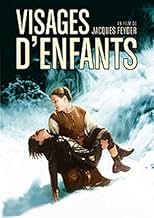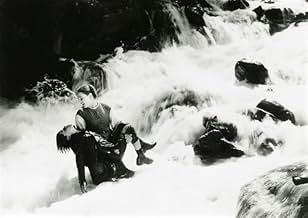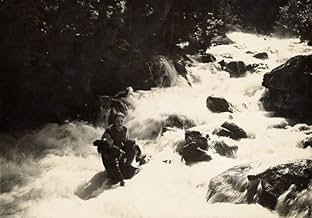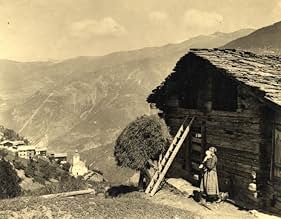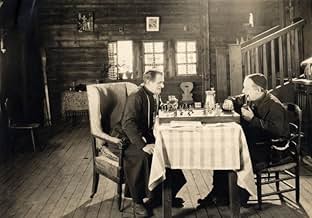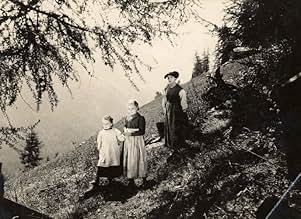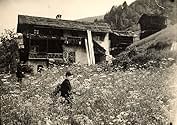Ajouter une intrigue dans votre langueA man whose wife has died remarries, and his new wife has a daughter of her own from a previous marriage. The man's young son, however, who loved his mother deeply and misses her terribly, r... Tout lireA man whose wife has died remarries, and his new wife has a daughter of her own from a previous marriage. The man's young son, however, who loved his mother deeply and misses her terribly, resents his father's new wife, not wanting her to take the place of his beloved mother, and... Tout lireA man whose wife has died remarries, and his new wife has a daughter of her own from a previous marriage. The man's young son, however, who loved his mother deeply and misses her terribly, resents his father's new wife, not wanting her to take the place of his beloved mother, and makes life miserable for his new stepsister..
- Director
- Writers
- Stars
Avis en vedette
The film begins with a funeral. The Mayor's wife has just died--leaving him and his two children behind. After trying to make a go of it, the man realizes he needs a mother for his children and proposes to a local widow--who herself has a young daughter. But, unlike the Brady Bunch, this new blended family did not magically work out--as the parents, in hindsight, did a pretty lousy job of breaking this to the kids--in particular, the 12 year-old boy. It actually came to him as a bit of s surprise--and to make matters worse, they gave his old bedroom to his new step-sister and sister. You could understand how the kid could feel alienated. Over the next few months, the boy (Jean) had a hard time adjusting. Much of his anger was displaced on his step-sister. Ultimately, this resulted in two near-tragedies.
Overall, a very good story that doesn't get too schmaltzy and has a lot of nice action. Well-paced, nice cinematography and very good acting by the children--this one is well worth seeing.
By the way, while it doesn't significantly harm the picture, like many of the silents, a small portion of the film has severely degraded. This is very normal and the damage is minimal but pretty obvious when it occurs. The old nitrate film stock was very unstable and tended to turn to powder, liquefy or even explode!
His character is old enough to know something about death and what it means, but his younger sister doesn't have a clue. He walks with his father behind the coffin to see her buried, grieves for her and watches his father's tears with sympathy, while young Pierrette plays with her cat and whatever else she can find. Forest is very good here, all young pillar of strength until he collapses at the graveside, but he's ably assisted by some rapid fire montage work by the editors. This was originally released in 1925 so I wonder if it was before or after Battleship Potemkin with its groundbreaking sequence on the Odessa Steps.
Jean is obviously very attached to his mother, to the degree that he visits her grave every Sunday and sees her portrait come to life and smile at him. However his father feels bad that in the absence of a wife his house and children are being neglected, so he marries again, his new wife being Jeanne Dutois, a young widow who can't pay her rent. This impacts Jean not just because he has a stepmother but because he acquires in the process a stepsister, Arlette, and that leads to plenty of conflict.
The story is solid, very much in the European vein of slow and serious stories full of character development, and that's a good thing. There's decent camera-work too, Feyder and his cinematographers also making plenty of use of the gorgeous countryside to frame his story. It's supposedly France but it was shot in the Swiss Alps and you just can't go wrong with the Swiss Alps as a cinematic background! Feyder seems to be always great when filming in crowds or in public and this film is no exception to that rule. The accompanying 2004 soundtrack by Michael Coppola is great if not awesome, and in fact there's very little bad to say.
The only downside to me was pretty minor, and that was in what seemed to be a little clumsiness in the delivery of some of the actors early on: all adults, I should add, as the children are simply superb. I'm not talking about the traditional overacting of the silent era as this would have been seen as an underplayed film on those grounds. I think it just took a half hour or so for everything to get moving properly, because the film, as you'd expect from the title, is about the kids and maybe the adults had a harder time getting into the story when there were no kids around.
I can't fault any of the scenes that have children in, whether they be between Jean and his stepsister, played by Arlette Dutois, or with adults like Henri Duval as his uncle or Rachel Devirys as his stepmother. It's only early scenes between Vina and Duval or Vina and Devirys that don't quite carry the same weight. Thankfully the children are present for almost the entire film and these scenes are hugely impressive and yet very subtle, often without the benefit (or the distraction) of title cards.
I got drawn into this one far more than into Crainquebille and, to be honest, got lost in the magic of it. By the time the end arrived, which seemed far too soon even though the film is nearly two hours long, I'd forgotten about all of that minor downside entirely. What amazed me most is that none of the three children had long careers in the film industry, stunning given their performances here. According to IMDb, this was Arlette Peyran's only film, and Pierrette Houyez only made three. Jean Forest, the star of this film, went on to appear in ten in all, but switched to a career in radio. What a shame!
This excellent silent is almost derailed in the early running. Specifically, it is when young Jean is determined too sensitive to attend his father's second marriage and sent off to live with his godfather (Henri Duval). The kindly priest's mission is to break the news to Jean gently, and return him within a month. It ends with Mr. Duval dropping Jean off some distance from his house; the boy walks home, alone and unannounced. Then Duvall, presumably a close family friend, is not seen again. All in all, this is a strange way for the adults in this drama to treat a child. It illustrates isolation, of course, but could have been left out or done more eloquently...
However, there are no problems understanding this story. In the opening, director Jacques Feyder crushes the screen with the dead mother's coffin, which we see through the eyes of her son. The death of a parent and introduction of a replacement has a profound effect on young Jean. We feel the full weight of that casket. Performers, especially the children, are captured acting naturally. Location photography of the Swiss Alps is beautiful, especially as set up and angled by Mr. Feyder and his crew. The indoor/outdoor sets are terrific, also. And, the ending approaches D.W. Griffith's "Way Down East" (1920) in icy edited excitement.
******** Visages d'enfants (1/24/25) Jacques Feyder ~ Jean Forest, Victor Vina, Rachel Devirys, Henri Duval
This all important masterpiece is a must see for all movie buffs.
Breathtaking scenery and brilliant cinematography help to capture the raw wild beauty of a troubled child's view of the world.
It would take many years and the brilliance of a Bergman or Lean to recapture such insight and clarity of vision on film.
One interesting note...I think I discovered a rather major gaffe not mentioned on IMDb.
The csreen fades out on a visciously chilling depiction of a brutally cold night (which includes a character being rescued from an avalanche of snow...a title reads "The Next Morning"....and we are suddenly in spring (if not summer) and the horse drawn sleigh of the previous scenes is now a cart...
Still...an otherwise brilliant and fascinating film.
Le saviez-vous
- AnecdotesThe film was an artistic success but a terrible commercial failure, causing the bankruptcy of Mundus Film. As for de Zoubaloff, he moved into the radio set selling while Porchet became the technical manager of the Swiss Film Office.
- ConnexionsFeatured in Cinema Europe: The Other Hollywood: The Music of Light (1995)
Meilleurs choix
Détails
- Date de sortie
- Pays d’origine
- Sites officiels
- Langues
- Aussi connu sous le nom de
- Faces of Children
- Lieux de tournage
- sociétés de production
- Consultez plus de crédits d'entreprise sur IMDbPro
- Durée
- 1h 54m(114 min)
- Couleur
- Mixage
- Rapport de forme
- 1.33 : 1

